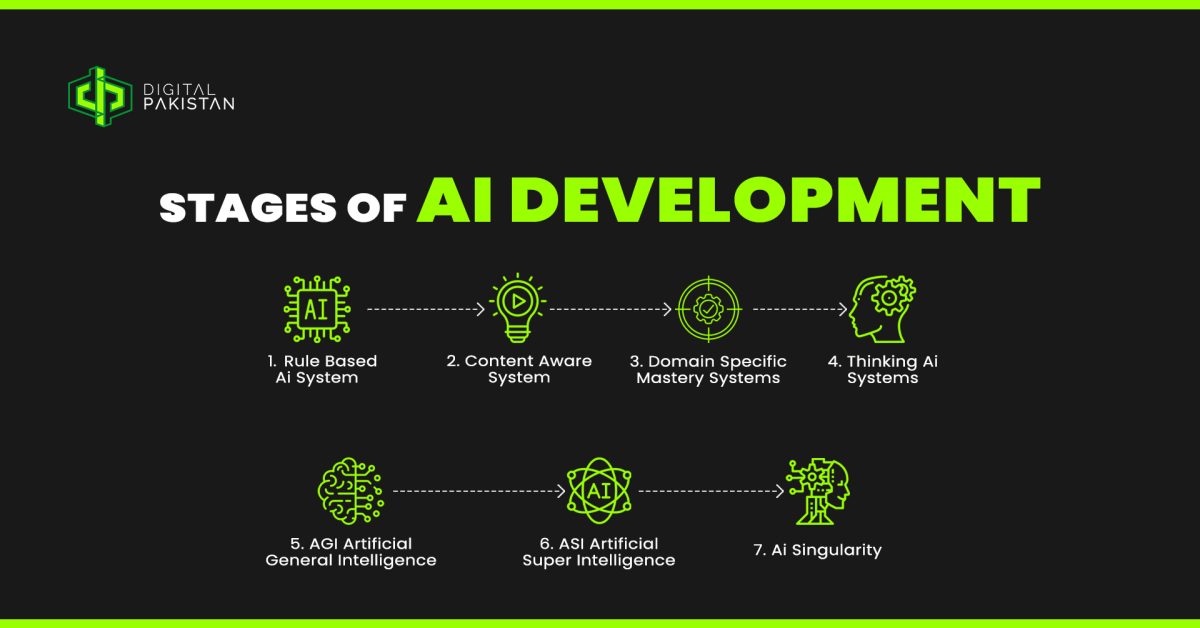
Game Now Takes Center Stage: Jazz’s ‘Wow Summer Camp’ Event
August 28, 2024
MMBL Wins ‘Best Digital Banking Services’ Award
September 13, 2024EVOLUTION OF AI: JOURNEY FROM SIMPLE RULES-BASED AUTOMATION TO ARTIFICIAL SUPERINTELLIGENCE
Artificial Intelligence (AI) is not new however, recent advances like OpenAI’s ChatGPT has made it one of the most transformative technologies of our time, but its development spans various stages with each having its own complexity and impact. From simple automation to the potential of Artificial Super Intelligence (ASI), the AI evolution reveals exciting possibilities and significant challenges. In this article, we’ll explore the seven stages of AI and focus specifically on the transition from Artificial General Intelligence (AGI) – current stage to Artificial Super Intelligence (ASI) through the enhancement of reasoning and decision-making abilities.
Stage 1: Rule-Based AI Systems
This is the most basic form of AI also called one-task or reactive systems. Such machines are designed to perform specific tasks and repetitive tasks but lack memory or the ability to use past experiences or context to influence future decisions. These systems operate based on a pre-defined set of rules or an algorithm given to them by programmers. They are excellent for tasks with clear rules, such as diagnosing a mechanical problem or processing tax
forms.
Stage 2: Context Aware Systems
Context awareness represent a significant evolution in artificial intelligence. This stage of AI expands on Rule Based AI by incorporating learning from past experiences through retaining context, i.e. retaining past interactions and use them for future responses. Examples of this stage may include Siri or Google Assistant which uses past interactions to generate responses.
Stage 3: Domain-Specific Mastery Systems
AI systems at this stage can be found in many specialized applications. As the name suggests, they are not generalists but super optimized to specific situations. A relevant example of this stage could be Google’s Deep Mind AlphaGo, which was trained specifically to master the complex board game Go.
Stage 4: Thinking AI Systems
AI systems are this stage mimics human thinking process. They have some basic form of reasoning and therefore, understand complex ideas. Such systems employ neural networks and deep learning that teaches computers to process data in a way that is inspired by the human brain. Such techniques
allow machines to continuously learn from experience and improve over time.
Stage 5: Artificial General Intelligence (AGI) – Current Stage
AGI is the point where AI tends to become as capable as human mind itself. An AGI system starts to develop skills of learning, understanding, adapting and then doing it all over again, i.e. recursing in a wide variety of tasks. Unlike previous stages, which is task-specific, AGI can generalize across different domains. Achieving AGI is a gigantic leap because it means that machines would have the ability, flexibility and adaptability we associate with human intelligence. This AI could interact more naturally with people, recognizing that humans have beliefs, desires, and experiences that influence their actions. Example of such systems is OpenAI’s ChatGPT itself. Less hyped but equally mature systems include Google’s Gemini & Meta’s LLaMA.
Stage 6: Artificial Super Intelligence (ASI) – Next Frontier
The next frontier of AI transition from AGI to ASI. The leap from AGI to ASI is where the true revolution in AI lies. ASI represents the stage where AI surpasses human intelligence in all aspects—problem-solving, creativity, decision-making, and even very human attributes e.g, emotional intelligence. An ASI would have the reasoning skills far beyond human comprehension, combining it with present day large computing power & enormous amount of digitalized knowledge base, it would be capable of solving problems we can’t even begin to comprehend. The core development in the AGI-to-ASI transition centers on perfecting following reasoning skills.
Causal Reasoning: One of the most significant challenges for AI is understanding causality—a fundamental rule of nature. Understanding the cause-and effect relationships that govern the real world. The transition from AGI to ASI would certainly require a breakthrough in causal reasoning. While AGI relies on statistical correlations, i.e. transformer functions, ASI would develop a deep understanding of long causal chains, enabling it to solve complex, multi dimensional problems & predict fairly accurate outcomes.
Meta-Reasoning: AGI has initially reached human-level reasoning by mimicking human thought patterns, but for this AGI to ASI transition, it would require an advanced form of meta-reasoning. Meta-reasoning involves the AI reflecting on its own decision-making process, in essence developing cognition thereby, evaluating strategies, executing and optimizing them autonomously and recursively.
Ethical and Moral Reasoning: A key aspect of reasoning in AI is ethical decision-making. AGI is expected to make decisions on generally accepted moral codes, but given the advanced capabilities of ASI, ethical reasoning would need to be equally more advanced. ASI would have to handle moral dilemmas in ways that are consistent, transparent, and beyond the limitations of human bias.
Exponential Learning: Humans tend to learn incrementally and incoherently, but ASI would benefit from exponential learning. It would be able to process vast amounts of available data, analyze it in near real-time, and continuously iterate to update its understanding. Humans on the other hand require time to absorb and process new information.
Stage 7: The AI Singularity
Given AI successfully does overcome reasoning challenges as mentioned above, ASI would surpass human intelligence in every conceivable domain. AGI with its superior reasoning skills will ultimately become aware of itself – spawning the age of singularity. While Singularity represents a hypothetical future point in time when technological growth becomes uncontrollable and irreversible and will transform fields like medicine, engineering, and environmental science, but without proper safeguards, it could also pose significant risks to humanity itself.
Conclusion:
The journey from pre-defined rules to ASI is one of the most significant intellectual challenges in human history. While we have already made incredible strides toward AGI, the leap to ASI involves not just more data and computing power but the development of advanced reasoning capabilities that allow machines to think, adapt, and innovate at a level far beyond human comprehension. Managing this transition responsibly will be the key to ensuring that ASI becomes a beneficial force for humanity. As we stand on the brink of the AI revolution, our collective responsibility will determine whether ASI becomes a force for the greater good or a dangerous turning point in human evolution.
About the author
The author is an engineer by education and a leader by profession, driven by an inquisitive nature and a passion for innovation. With a knack for questioning the ordinary and exploring the less travelled paths. A spirited storyteller, he seeks to simplify complex concepts into engaging narratives, making even the most intricate ideas accessible and thought provoking for a wider audience.






